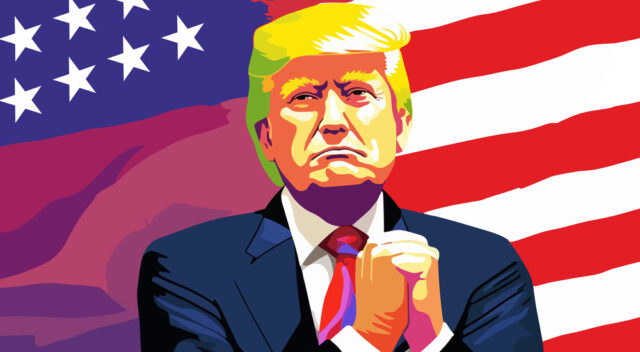Donald Trump’s latest venture, “The DeFiant Ones,” marks his entry into the world of decentralized finance (DeFi). It promises to revolutionize the financial landscape by providing services to those who have traditionally been underserved by mainstream banking systems. Spearheaded by his sons, Eric and Donald Jr., they market the platform as a disruptor to Wall Street’s entrenched influence over American finance. However, the question remains: Can this initiative live up to its ambitious promises? Or, will it falter amid the volatility of the cryptocurrency market and Trump’s own controversial history with digital assets?
A Bold Vision for DeFi
“The DeFiant Ones” represents a significant pivot for Donald Trump, who once derided cryptocurrencies as a “scam” during his presidency. Now, as he prepares for another run at the White House, Trump has positioned himself as a proponent of decentralized finance – a sector he believes can democratize access to financial services. The platform aims to leverage blockchain technology to bypass traditional financial intermediaries. This approach gives users more direct and potentially more equitable access to financial products such as loans, savings accounts, and investments.
The Trump family has emphasized that this platform is not another fleeting memecoin project. It is a serious attempt to disrupt the status quo in finance. Eric Trump has described the project as “digital real estate,” a form of collateral accessible to anyone. It could help democratize the financial system by making it easier for people to secure financing without relying on traditional banks.
The Challenges Ahead
Despite the grand vision, several challenges lie ahead for “The DeFiant Ones.” First and foremost is the inherent volatility of the cryptocurrency market. The value of digital assets can fluctuate wildly. That poses a significant risk for a platform aiming to serve as a stable and reliable financial service provider. Additionally, the DeFi sector itself is still in its nascent stages. Many regulatory and security concerns are yet to be fully addressed. While decentralized finance offers innovation potential, it also opens the door to new forms of financial risk. That includes smart contract vulnerabilities and the lack of consumer protections offered by traditional banking systems.
Moreover, the Trump family’s past ventures into the digital asset space have been met with mixed reactions. Donald Trump has successfully launched several NFT collections and has become more involved in the crypto community. However, there are lingering concerns about the long-term viability of his projects. Critics argue that Trump’s pivot to crypto might be more about aligning with the populist and anti-establishment sentiments of his base rather than a genuine belief in the technology’s potential.
Implications for the Broader DeFi Landscape
If successful, “The DeFiant Ones” could have significant implications for the broader DeFi landscape. By attracting mainstream attention to decentralized finance, the platform could help legitimize the sector and encourage more widespread adoption of blockchain-based financial services. This, in turn, could spur further innovation and competition in the space, driving down costs and improving access to financial products for consumers globally.
However, success is far from guaranteed. The platform’s ability to deliver on its promises will depend heavily on its execution and how well it can navigate the complex regulatory environment surrounding cryptocurrencies and DeFi. The Trump family will need to convince regulators and users that their platform is safe and reliable. They must also demonstrate that it is genuinely capable of providing the financial freedom and inclusivity that it promises.
>>> Read more: Trump’s $TRUMP Coin: Genuine Philanthropy?
Donald Trump’s foray into decentralized finance with “The DeFiant Ones” is a bold move. It could potentially reshape the financial landscape if it lives up to its ambitions. However, the path to success is fraught with challenges, from market volatility to regulatory scrutiny. As the platform gears up for launch, all eyes will be on how it addresses these challenges and whether it can truly deliver on its promise to democratize finance for all.
Readers’ frequently asked questions
What exactly is “The DeFiant Ones” platform, and how does it work?
“The DeFiant Ones” is a decentralized finance (DeFi) platform launched by Donald Trump, with significant involvement from his sons, Eric and Donald Jr. The platform aims to provide financial services typically offered by traditional banks, such as loans, savings, and investments, but in a decentralized manner. Instead of relying on intermediaries like banks, “The DeFiant Ones” uses blockchain technology to enable direct peer-to-peer transactions. The platform is marketed as “digital real estate,” implying that users can leverage blockchain-based assets as collateral to access financial services. This is seen as a way to democratize finance by making these services more accessible to those who are underserved by traditional banks.
What are the potential risks associated with using a platform like “The DeFiant Ones”?
While “The DeFiant Ones” promises to democratize access to financial services, there are several risks associated with using a DeFi platform. First, the volatility of the cryptocurrency market can lead to significant fluctuations in the value of assets held or used on the platform. That could affect users’ financial stability. Additionally, the DeFi sector is still evolving. Issues such as smart contract vulnerabilities, lack of consumer protection, and regulatory uncertainty could pose challenges. Users should also be aware that DeFi platforms, while innovative, are often less regulated than traditional financial institutions. This means there may be fewer safeguards in place to protect against fraud or other forms of financial misconduct.
How does Trump’s involvement in the cryptocurrency space affect the credibility and potential success of “The DeFiant Ones”?
Donald Trump’s involvement in the cryptocurrency space is a double-edged sword. On one hand, his high-profile status and large following could bring significant attention and legitimacy to “The DeFiant Ones,” potentially driving widespread adoption of the platform. His pivot to embracing digital assets, after previously criticizing them, indicates a strategic shift that aligns with current trends in financial technology. However, Trump’s past ventures, including those in the digital asset space, have been met with mixed success. Thus, his controversial reputation may lead some to view this platform with skepticism. The success of “The DeFiant Ones” will depend on its ability to deliver on its promises and navigate the complexities of the DeFi landscape, beyond just leveraging Trump’s brand.
What Is In It For You? Action Items You Might Want to Consider
Dive into the Pre-Launch Hype and Speculate Smartly
Don’t just watch from the sidelines—consider taking advantage of the pre-launch buzz surrounding “The DeFiant Ones.” If you have a high-risk tolerance, explore opportunities to invest in early tokens or assets linked to the platform before the official launch. The hype alone could create a short-term spike in value, presenting a window for quick gains. But be strategic: closely follow insider news and community sentiment to time your entry and exit points.
Leverage Potential Market Shocks for Arbitrage Opportunities
Given Trump’s controversial profile, any public statement or regulatory pushback could cause sudden market movements. Prepare to capitalize on these shocks by setting up automated trading bots or alerts to spot arbitrage opportunities across different exchanges. Quick reactions to Trump’s announcements or any legal challenges could allow you to profit from price discrepancies in real time.
Engage Directly with the DeFi Community for Insider Insights
Don’t underestimate the power of being part of the right circles. Join Telegram groups, Discord channels, or any official communities related to “The DeFiant Ones.” Engaging directly with early adopters and insiders could give you a competitive edge. It may offer you insights not yet reflected in the broader market. Being an active participant could also give you a first-mover advantage on any airdrops, beta-testing opportunities, or exclusive early deals.










